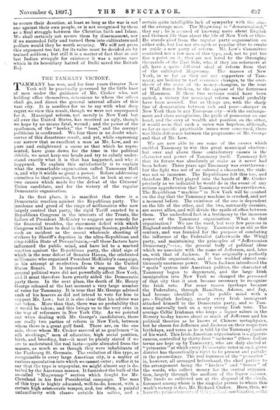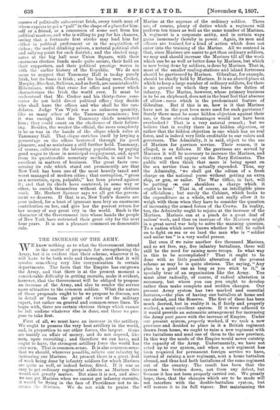THE TAMMANY VICTORY.
TAMMANY has won, and for four years Greater New York will be practically governed by the little knot of men under the guidance of Mr. Croker who, not holding office themselves, determine to whom the offives shall go, and direct the general internal affairs of this vast city. It is needless for us to say with what deep regret we view this result, though we were not unprepared for it. Municipal reform, not merely in New York but all over the United States, has received an ugly, though we hope by no means fatal, wound ; and the power of the spoilsman, of the "heeler," the "boss," and the corrupt politician is confirmed. We fear there is no doubt what- soever of this disastrous result, and yet, while expressing our sorrow that so excellent a man as Mr. Low, and so pure and enlightened a cause as that which he repre- sented, have gone down for the time in the political dilnicle, we must keep our heads and try to calmly under- stand exactly what it is that has happened, and why it happened. To explain this satisfactorily is to explain what the remarkable organisation called Tammany Hall is, and why it wields so great a power. Before addressing ourselves to that question, however, let us look at one or two causes which made for the defeat of the Citizens' Union candidate, and for the victory of the regular Democratic organisation.
In the first place, it is manifest that there is a Democratic reaction against the Republican party. The insolence and greed of the rings of millionaires who now largely control that party, the rigid Tariff enacted by a Republican Congress in the interests of the Trusts, the failure of President McKinley to suggest any remedy for the financial troubles, the enormous deficit with which Congress will have to deal in the ensuing Session, probably such an incident as the recent wholesale shooting of strikers by Sheriff's deputies in the ultra-Republican and ring-ridden State of Pennsylvania,—all these factors have influenced the public mind, and have led to a marked reaction against the Republican party, the chief sign of which is the near defeat of Senator Hanna, the celebrated millionaire who organised President McKinley's campaign, in his attempt at re-election from Ohio to the United States Senate. It is impossible to suppose that this general political wave did not powerfully affect New York, and it must therefore have greatly aided the Democratic party there. In the next place, the death of Mr. Henry George released at the last moment a very large number of votes for Tammany. It is true that Mr. George advised such of his hearers as did not intend to vote for him to support Mr. Low ; but it is also clear that his advice was not taken. More than that, there was no probability that it would be taken; and this brings us to the very crux in the way of reformers in New York City. As we pointed out when dealing with Mr. George's candidature, there are really two parties of reform in New York, between whom there is s. great gulf fixed. There are, on the one side, those whom Mr. Croker sneered at as gentlemen "in silk stockings," men of education, high social position, birth, and breeding, but—it must be plainly stated if we are to understand the real facts—quite alienated from the masses, as much so as though they were inhabitants of the Faubourg St. Germain. The evolution of this type, so recognisable in every large American city, is a matter of curious speculation into which we cannot enter; suffice it to say that the type is unpopular, we might almost say is de- tested by the American masses. It furnished the bulk of the so-called " Mugwump " section which fought for Mr. Cleveland in his first Presidential campaign. The man of this type is highly educated, well-to-do, honest, with a certain high aristocratic temper, and, too often, a painful unfamiliarity with classes outside his milieu, and a certain quite intelligible lack of sympathy with the aims of the average man. The Mugwump is "denationalised," they say ; he is accused of knowing more about English and German life than about the life of New York or Ohio. He stands aloof from the regular party organisation on either side, but has not strength or popular fibre to create or guide a new party of reform. Mr. Low's Committee contained not a few men of this type, and, not to put too fine a point on it. they are not loved by the thronging thousands of the East Side, who, if they are reformers at all, have a quite different ideal of reform from that, of the cultivated Mugwump. The masses of New York, in so far as they are not supporters of Tam- many, are lookine to vast economic changes, to the over- throw of the seats of the money-changers, to the rout of Wall Street brokers, to the capture of the fortresses of Mammon. If these two sections could have been united, a victory for municipal reform would probably have been assured. But as things are, with the sharp line of demarcation between rich and poor—sharper in New York than in any European city—with the estrange- ment and class antagonism, the pride of possession on one hand, and the envy of wealth and position on the other, it would seem that such a union was hopeless, although, so far as specific practicable issues were concerned, there was little difference between the programme of Mr. George and that of Mr. Low.
We are now able to see some of the causes which enabled Tammany to win this great municipal election ; but over and above these contributory causes is the character and power of Tammany itself. Tammany felt that its future was absolutely at stake as it never had been before. Three years ago Tammany was overthrown ; but the fight was not of so colossal a character, the stake was not so immense. The Republicans felt this too, and therefore Mr. Platt played into the hands of Mr. Croker precisely as we indicated he would do in the event of any serious apprehension that Tammany would be overthrown. The Republican " machine " in New York will be crushed on the day that the Tammany machine is crushed, and not a moment before. The existence of the one is dependent on the life of the other, and the two, outwardly enemies, are secret allies, and will divide the spoils of office between them. The undoubted fact is a testimony to the immense power of the Tammany organisation. What is that organisation ? We use the word, but very few persons in England understand the thing. Tammany is as old as the century, and was founded for the purpose of combating the influence of the Federalist (afterwards the Whig) party, and maintaining the principles of " Jeffersonian Democracy,"—i.e., the general body of political ideas which we associate with the name of Jefferson, and, latei on, with that of Jackson. It was originally a perfectly respectable organisation, and it has wielded almost con- tinuously enormous power. When Jackson introduced the " spoils " system into American politics, the character of Tammany began to degenerate, and the large Irish immigration into New York so changed the personnel of that city that it soon became necessary to recognise the Irish vote. For some reason (perhaps because the Federalists, through Hamilton, Adams, and Jay, had become identified in the public mind with a pro - English feeling), nearly every Irish immigrant attached himself to the Democratic party, and so Tam- many naturally took on a very strong Irish tone. The average Celtic Irishman who keeps a liquor saloon in the Bowery to-day knows about as much of Jefferson and his political theories as he knows of Chinese metaphysics, but he cheers for Jefferson and Jackson on their respective birthdays, and votes as he is told by the Tammany leaders of his ward. This Irish-American organisation is a gigantic caucus, controlled by thirty-four" sachems" (these Indian terms are kept up by Tammany), who are duly elected at "primaries "at which every Democratic voter in each given district has theoretically a right to be present and partake in the proceedings. The real business of the " primaries " is, however, all arranged beforehand, the chief parties to the arrangement being the "heelers" and " bosses " of the wards, who collect money for the central organisa- tion, largely through the medium of the liquor saloons.. The funds so collected are at the disposal of the chiefs, foremost among whom is the singular person to whom this week's victory is due, Mr. Richard Croker. Here, then, we
have the prime elements of this / eombination,—the. masses of politically subservient Irish, every tenth man of whom expects to get a "pull" in the shape of a place for him- self or a friend, or a concession of some sort from his political masters, and who is willing to pay for his chances, seeing that a fortunate first stroke may lead him far either in political preferment or in the acquisition of riches ; the useful drinking saloon, a natural political club and rallying-point for each district ; and the elected mag- nates at the big hall near Union Square, with their enormous election funds made quite secure, their hold on their supporters, and their political prestige woven in with the earlier history of the Republic. We do not mean to suggest that Tammany Hall is to-day purely Irish, but its basis is Irish ; and its leading men, Croker, Murphy, Sheehan, Sullivan, and so forth, are unmistakeable Hibernians, with that craze for office and power which characterises the Irish the world over. It must be understood that Mr. Croker and his thirty-three asso- ciates do not hold direct political office ; they decide who shall have the offices and who shall be the can- didates. Judge Van Wyck was an unknown quantity, like so many other of the Tammany nominees ; but it was enough that the Tammany chiefs nominated him ; they could count on the obedience of their follow- ing. Besides, the weaker the official, the more completely is he as wax in the hands of the clique which rules at Tammany Hall. That clique enriches itself by levying a percentage on the offices bestowed through its good pleasure, and so maintains a still further hold. Tammany, of course, cultivates the labouring population by paying good wages to those in municipal employment, and, apart from its questionable monetary methods, is said to be excellent in matters of business. The great facts con- cerning its rule which stand out prominently are that New York has been one of the most heavily taxed and worst managed of modern cities ; that corruption, "gross as a mountain, open, palpable," has been proved against it ; and that its chiefs have contrived, in some way or other, to enrich themselves without doing any obvious work. Mr. Herbert Spencer says we all get the govern- ment we deserve. If that is so, New York's deserts are poor indeed, for a knot of ignorant men levy an enormous contribution on her, and give her the poorest return for her money of any great city in the world. Such is the character of the Government into whose hands the people of New York have entrusted their great city for the next four years. It is not a pleasant comment on democratic rule.























































 Previous page
Previous page